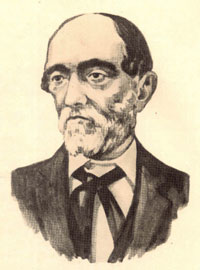Jeronim DE RADA

The earth had transformed the oaks
The earth had transformed the oaks,
Fresh sea water sparkled
Blue at the new day rising;
But the dove of Anacreon
Lived on in ancient Tempe.
One day it departed for the mountains for water
And did not return as was its habit.
It did not freeze in the snow
Nor was it wounded by an arrow,
But flew onward until it landed
At my happy home.
When the house and land
Reappeared beside the sea at dawn,
What joy welled in my eyes.
It awoke me, brushing
Against the window panes.
I arose and looked outside:
The grapes in the ripening vineyards
Covered our fields,
The blossoming flax
Swayed in the wind,
Gently smiling, and like its blossoms
Was the colour of the sky.
You could look out and forget
The cares of this world.
The gleaners were singing
Amidst the sheaves. I had just
Returned from abroad, to be reunited
With my sisters. My name was
Constantly on my mother's lips.
A joy filled my body
Like that of a fair maiden
Who, in the warmth of her bed at night,
Senses her breasts
Beginning to swell.
[Canti di Milosao, excerpt from canto 1, Naples 1836, translated from the Albanian by Robert Elsie, and first published in English in History of Albanian literature, New York 1995, vol. 1, p. 163-164]
Like two radiant lips
The vineyards were golden,
Foxes with their exhausted young
Were descending from the mountains
At the end of the harvest,
At the time of year when the sun
Retreats from such places (as mothers
Who have sung and danced retreat from earth),
At the time I left for Fjokat.
Tall and with embroidered cuffs
And braided hair
Bound in a white ribbon,
There was a maiden at the fountain,
Pensive her brow,
Her scarf tied to a blue sash
Extending to the ground.
The moment she sensed my presence
She turned towards me,
Elegant and graceful,
Trembling with joy.
The lad: "Will you give me a drop of your water, maiden?"
The maid: "As much as you wish, sir."
"Whose daughter are you, maiden?"
"Are you not from here?"
When as a lad I left home
For Salonika, there were no maidens
In the village with such charm."
Lifting her jug
She said blushingly:
"I am the daughter of Kollogre"
And departed, her head uncovered.
Though she took that path,
The thorns that covered it
Did not scratch her,
For I held them back
With my bleeding arms.
We seemed on that evening
Like two radiant lips
In a moment of ecstasy.
[Canti di Milosao, excerpt from canto 2, Naples 1836, translated from the Albanian by Robert Elsie, and first published in English in History of Albanian literature, New York 1995, vol. 1, p. 165-166]
Can a kiss be sweeter?
It was Sunday morning
And the son of the noble matron
Went to visit the fair maid
To ask for a drop of water,
For he was dying of thirst.
He found her alone by the hearth
Braiding her hair.
They loved one another, but spoke not of their love,
The maiden with a smile on her lips:
'Why must you fly off like the wind?'
'They're awaiting me for discus throwing.'
'Wait a moment, I've kept
Two ripe apples for you.'
Holding her combed hair
With one raised hand
Over her pale ears,
She plunged the other into her bodice
And pulled out the apples,
Placing them in his hands,
Blushing with embarrassment.
Tell me, oh lovers,
Can a kiss be sweeter?
[Canti di Milosao, excerpt from canto 4, Naples 1836, translated from the Albanian by Robert Elsie, and first published in English in History of Albanian literature, New York 1995, vol. 1, p. 167-168]
|
BACK

